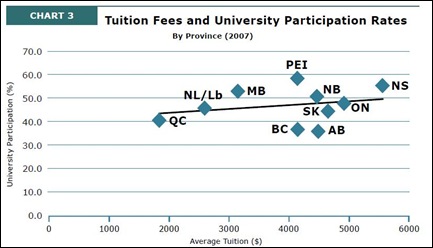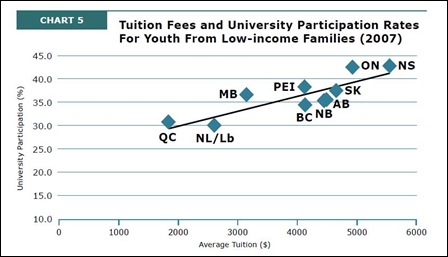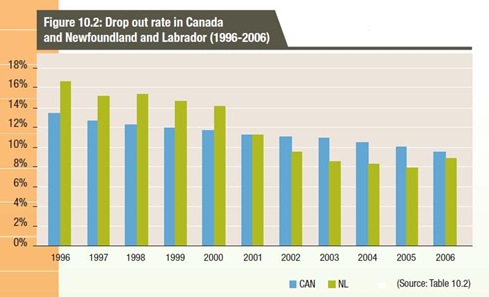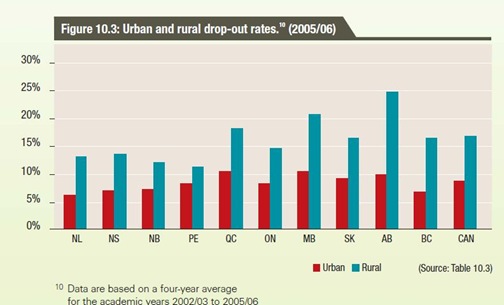The real political division in society is between authoritarians and libertarians.
17 January 2013
We can get there from here #nlpoli
Geographic illiteracy shocks people. Well, it should, just like they should be appalled that 44% of the people over 15 years of age in this province read below the minimum level needed to function in modern society. And they should be left speechless at the idea that 66% of the people in Newfoundland and Labrador over 15 years of age lack the numeracy skills for modern society.
26 March 2012
Tuition Fees and University Participation #nlpoli
The connection between tuition fees and university participation was a big subject in the summer run-up to the general election and then in the general election last fall.
Just to give some additional food for thought on that topic, here are a couple of slices from a study done in September 2011 by the Frontier Centre for Public Policy.
Some observations from the study (page 11):
- The data show that university participation for 23 year olds from low-income families was lower in Quebec and Newfoundland, the two lowest-tuition provinces, than in any other province.
- Manitoba, the remaining low-tuition province, had a low-income participation rate that was nearly identical with the
national average. - Nova Scotia, with the highest average tuition fees in the country, boasted the highest university participation rate for
students from low-income families. - Ontario, with the second-highest tuition fees in the country, had the second highest participation rate for young people from low-income families.
In the time period for the study – 2003 to 2007 – Newfoundland and Labrador had the second lowest tuition in the country and participation rates were in the middle of the pack.
Graph both of them and you get this:
Some people argue that low tuition fees make it easier for people from low income families to attend university. maybe they do. But according to this study, other factors seem to having an impact. Here’s a chart that looks at participation and family income:
Just some food for thought.
- srbp -
29 October 2011
What he said: education bureaucrats version #nlpoli
The Telegram’s Brian Jones puts the new school board policy on dishonesty in the correct perspective:
Behaviour is not separate from their beloved “academic outcomes” (curses on educational jargon; in former times, teachers simply and more accurately referred to “results”).
In fact, behaviour is an essential aspect of academics.
Responsible parents encourage their children to be diligent, hardworking and interested in their studies: put in effort; don’t be lazy; do your best.
The district’s new policy on cheating makes a mockery of parents’ efforts.
More importantly, the policy mocks students who don’t cheat. It insults their honest efforts to study and to learn.
Read the whole column. Jones nails a bunch of other aspects.
- srbp -
08 March 2011
The importance of education: education and the economy
The National Post’s Kelly McParland offered a colourful chart last November comparing a number of things, including federal transfers to provinces (on a per person basis), provincial gross domestic product and the amount spent per person on education.
There are also some bullet points.
One stood out:
Newfoundland has strong investment, high GDP, generous transfers, yet still has the country’s highest unemployment and spends very little on education. Might those last two be related?
They might well be related.
But then again, it is hard to know for sure given that the figures for per capita education spending, for example, are from 2006 and unemployment is from 2010. There’s no indication why the figures are from different years but they are; it’s not like the information is secret or otherwise unavailable.
As for employment rates, in October 2010 it was around 13% - according to the Post chart - and in October 2006, it was 14%. The participation rate is up slightly in 2010 compared to 2006 (61% versus 58-59%).
Still, it’s hard to escape the idea that there is a connection between education and economic performance.
Consider this some food for thought.
25 January 2011
The Basenjis of St. John’s
If there are dogs that won’t hunt, the Conservatives members of the House of Assembly representing seats in the metro St. John’s are the kind that won’t bark.
Back-bencher, cabinet minister or parliamentary secretary, they are all sitting idly by as the current administration demolishes the school system in the metropolitan area.
Thousands of students will suffer as a result of a poorly conceived and clumsily executed backroom deal between Eastern School District and the province’s education department to close schools and move students into lashed up space.
The school district will unveil a bunch of resolutions to implement the department’s plan tomorrow night. If you go by the versions that have already circulated to test what will get a majority, the school board trustees plan to ignore the thoughtful comments made by parents across St. John’s that oppose the back-room scheme and propose instead the plan already agreed upon by parents themselves in 2008.
There are huge problems in the scheme. For example, under the deal, the city core and downtown area will be left without a school of any kind. Students will have to be bussed across town. In another area, hundreds of students will be forced to change schools four times in five years until the provincial government finishes a new high school in the west end.
If they finish it.
If the school doesn’t get finished, the students will languish as refugees in sub-standard facilities.
The very idea of those things would be ludicrous even as a response to a disaster. Parents across St. John’s are gob-smacked that bureaucrats and politicians would deliberately plan to implement such a hare-brained scheme and dare to defend it.
But the fix has been in since well before Christmas. Trustees, the majority of whom are from outside St. John’s, are already in favour of the scheme.
Portable classrooms are reportedly on the way to house students from one junior high school who will be forced into grossly inadequate facilities for an unknown period of time.
Not a single member of the province’s legislature from the metro area will speak out to support their constituents.
That’s not a prediction.
That’s a guarantee.
Just watch.
- srbp -
05 November 2010
Drop-out drop detail
The 2008 report on schools from the provincial education department is a wealth of useful information on one of the most important government service areas.
Chapter 10 is about school leavers. In light of the Statistics Canada report on drop-outs, it’s worth taking a closer look at the way the drop-out rate dropped in this province.
As we know from the Statistics Canada report, 19.9% of young people dropped out of school in Newfoundland and Labrador, on average, in the three years 1991-1993. By 1996, that figure had declined to 16.7%.
By 2006, that number was down to 8.9%. The rate was lower in 2003, continued downward for the next two years and then jumped up in 2006. The current rate - 7.4% - is actually about what the rate was in 2005. The table is taken from the provincial government report.
Media reports indicate that a higher percentage of males than females dropped out in this province in 2009 (103% versus 6.6%). That’s a change from a decade and more ago when the male rate was dramatically higher. According to CBC, “while rates have declined for both sexes, the rate of decrease was faster for men, narrowing the gap between the two.”
The provincial education department has another statistic, though. It compares rural versus urban rates of school-leaving. Here’s the provincial government table comparing the rates for all provinces and for the country as a whole.
This sort of statistic doesn’t bode well for economic development in rural Newfoundland and Labrador. And it doesn’t get any better when one considers the trend in the Eastern district, for example, that shows those graduating high school in rural areas are more likely than urban students to leave with a general pass. n other words, they aren’t necessarily more likely to enter post-secondary education or training.
If a provincial government could only focus on one area in order to produce economic and social benefits to individuals and to the community as a whole, improving educational performance would be it.
Now it is interesting to pick up on comments on the other post on this report. Both noted the possible influence of the cod moratorium in 1992 on the decline. On the face of it, the answer seems to be that the moratorium did influence the rate. Young people in rural areas, especially males, tended to leave school since they could make a living in the fishery or other similar work with a limited education. Without the cod fishery they might have stayed in school.
Maybe.
The idea is worth exploring but the answer is likely to be more complex. Don’t forget that about 70,000 left Newfoundland and Labrador in the aftermath of the moratorium. While the drop-out rate declined dramatically in the period between 1993 and 2005, the persistence of a high drop-out rate in rural Newfoundland suggests there might be other factors at work.
Still, these numbers bear further consideration.
Especially considering the literacy and numeracy rates in the province.
- srbp -
04 November 2010
The importance of staying competitive
The Government of Ontario is creating 75 scholarships aimed at attracting top graduate students to Ontario universities.
Meanwhile, in another province, the university not only faces declining enrolment but also a freeze on funding for graduate students thanks - apparently - to some management cock-ups rather clumsily spun as a good thing.
On the upside, the provincial government’s research and development corporation announced on Wednesday it would provide funding over three years to support work by eight doctoral, 12 masters and two bachelors students at Memorial University.
“World-class research is at the heart of Memorial University and I’m delighted that 22 of our students have received RDC’s Ocean Industries Student Research Awards,” said Dr. Christopher Loomis, Vice-President (Research), Memorial University. “Graduate students are an essential part of Memorial’s research success. The competitive funding provided by this scholarship program will enable them to conduct research that is important to Memorial University and critical to the future prosperity of the province.”
- srbp -
02 August 2010
The politics of financing post-secondary education in Newfoundland and Labrador
Nottawa lays it out very neatly:
It's a political masterstroke. Having already taken all the political credit for the revenue generated by his predecessors, Williams is now doing the same with expenditures of his successors. It's brilliant. Whether or not it's sustainable is another thing.
That would pretty much put post-secondary education financing in line with the rest of the current administration’s management of public money: unsustainable.
Then again, nottawa sets out that sort of thing as well when he notes the costs in the policy re-announced today by the province’s education minister:
What is the point is that this announcement, at the time of its making, and on its one year anniversary is really not an "investment" of the "Williams Government" in any way shape or form. It's a commitment made on behalf of Williams' successor, the person who'll one day have to account for the cost of borrowing money at 4, 7, 8 or even 10% in order to lend it out to post-secondary students interest-free.
Evidently financial management and economics were not included in the curriculum at Darin King’s alma mater.
- srbp -
18 July 2010
Success by the wrong measure
As you’ll discover fairly quickly in reading a Telegram story on class sizes, the idea of capping the number of students per class is aimed at improving student achievement: more of them will pass; they’ll get higher grades; that sort of thing.
In other words, by giving each classroom teacher fewer students to work with, you improve the chances that each student will do better in school. You can measure that a number of ways, one of which would be the national testing administered in Grades Three, Six and Nine.
So it is more than a bit odd that the very first sentence in the story says this:
School enrolment numbers suggest the provincial government's plan to cap class sizes has been mostly successful.
The number of students in a school isn’t a measure of success for capping the size of classrooms. It’s one of the things that can influence the outcome - better performance by each student – and it is a factor that varies despite the efforts of school administrators.
After all, as the story acknowledges, “[f]rom June to September, for example, a lot of things can change, he said. Children can move away from a certain school or a certain area; children can move into an area.”
So this story doesn’t do anything but tell us all that the people working at school boards managed to put enough teachers in classrooms to hit a target ratio of students to teachers.
That’s nice but it doesn’t really mean they achieved the goal, which, you may recall, was about ensuring students did better in school.
Where’s the measure of that?
- srbp -
24 August 2009
Can we get that in writing for the minister?
Education minister Darin King seemed a wee bit confused about his own department’s policies in a recent macleans.ca story on competition among Atlantic Canada universities for students.
Darin King, the minister of education in Newfoundland and Labrador, said his province already has a recruiting advantage over its regional competitors.
Since 2001, tuition fees in the province have been frozen. And earlier this month, the Newfoundland and Labrador government eliminated interest on provincial student loans - the first province in the country to do so - in a move that could make it a more attractive place to study.
"We're trying to do our best to offer a student aid package ... and enticing them to come to Newfoundland," King said.
Of course, eliminating interest on provincial government student loans wouldn’t entice students from outside Newfoundland and Labrador “to come to Newfoundland” since they wouldn’t be eligible for that assistance.
Interest elimination only applies to residents of the province who receive student loans from the province. On top of that – because of the peculiarities of something called geography – they wouldn’t have to be enticed to come to the place where they already live anyway.
So it seems that education minister King can’t really explain at all what sort of “recruiting advantage” post-secondary institutions in Newfoundland and Labrador have when it comes to “enticing [students] to come to Newfoundland.”
He also doesn’t know the name of the province he represents either, but that’s another issue.
Perhaps the next time King gets one of the now infamous oral briefings for ministers, he should try a novel approach and take notes. That would be something he presumably learned to do as a student. Either that or he can get his officials to prepare written briefing notes so he can refer back to them later on. After all, notes are what students use to help them keep track of a wide range of information on a wide range of topics.
As education minister, Darin King should know the value of a written note even if some of his colleagues are more interested in covering their asses than covering the material.
This interview certainly shows the importance of a cabinet mi9nister knowing what he is talking about.
-srbp-



